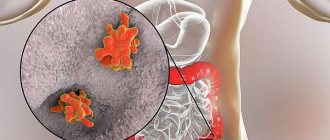Author, editor and medical expert - Klimovich Elina Valerievna.
Number of views: 45 953
Last update date: 28.10.2021
Average reading time: 9 minutes
Causes of frequent loose stools in adults Diseases accompanied by frequent loose stools Treatment
Chronic diarrhea is an extremely inconvenient problem to discuss, so patients initially try to ignore it. However, repeated attacks of abdominal pain, discomfort, loose stools and frequent trips to the toilet prevent normal work and study, travel and communication with people. With such complaints, the patient sooner or later consults a doctor.
Chronic diarrhea is usually referred to as frequent, loose stools that persist for more than 3 weeks1. In this case, the feces become unformed or liquid, and bowel movements occur more than 3 times a day1.
The frequency of stool in long-term intestinal disorders is of secondary importance. The traditional idea that the intestines should be emptied once a day in the morning is far from the truth. Even healthy people can have bowel movements up to 3 times a day1. The main sign of diarrhea is a change in the consistency and volume of stool, the presence of pathological impurities in them. If the stool is unformed and contains blood, pus, mucus or undigested food debris, one bowel movement per day is enough to indicate a gastrointestinal tract (GIT) disorder1.
Top
What is diarrhea?
The main sign that we are not talking about episodic diarrhea, but about a full-fledged disorder, is the daily frequency of stool. Diarrhea is loose stool that occurs in paroxysms: three times a day or more often. At the same time, the water content in feces, normally 50-80%, increases to 95%1.
Diarrhea can be acute or chronic.
Acute form
(up to 14 days) may appear as a result of poisoning, eating allergenic foods2, intolerance to certain foods, medications, or the entry of certain viruses and bacteria into the body2.
Chronic
(from a month or more) - as a result of taking antibiotics, laxatives. The cause may also be certain diseases of the gastrointestinal tract2.
The second most important sign is the condition of the stool. Color, consistency and the presence of impurities may indicate various diseases. For example, watery and loose stools, as well as a greenish tint to the stool, indicate the development of an intestinal infection. The cause of loose stools that are light in color and clayey in appearance may be damage to the small intestine and its initial sections.
Acute diarrhea
A very common condition, usually resulting from eating food or water contaminated with bacteria, their toxins, viruses and protozoa. Infectious diarrhea is usually short-lived, so an infectious cause is rarely identified in patients with diarrhea for more than 10 days. Alcohol intoxication, various drugs, including antibiotics, cytotoxic drugs, non-steroidal anti-inflammatory drugs, can cause acute diarrhea.
Traveler's diarrhea is also recognized
. It develops in the first days in people traveling to exotic regions of the planet other than their own and is associated with the consumption of food and water with a different qualitative and quantitative composition of non-pathogenic microbial flora.
We can talk about the acute nature of diarrhea if the duration is no more than 3 weeks; otherwise, diarrhea is considered chronic.
Causes of loose stools
Episodes of loose stools that plague a person for one or several days are not a separate disease. This is just one symptom of functional, organic or neural dysfunction. Loose stools that persist for a long time may be accompanied by other clinical manifestations: abdominal pain and cramps, fever, chills, nausea, vomiting, dizziness. It is on the basis of a set of symptoms that one can most accurately determine the cause of loose stools.
The most common causes of diarrhea in adults are3:
- food allergies;
- lactose intolerance (almost instantaneous reaction to milk);
- intestinal infection;
- viral or bacterial infection;
- neurogenic factor (stress, neurotic disorders, emotional breakdowns).
Loose stools may also indicate pathologies of other organs, such as4:
- cystic fibrosis (a hereditary disease that affects a number of organs, from the liver to the gonads);
- pancreatitis (a group of diseases associated with inflammation of the pancreas);
- gastritis with secretion deficiency;
- oncological diseases;
- adrenal insufficiency;
- diabetes;
- hyperthyroidism (a syndrome caused by increased hormonal activity of the thyroid gland);
- cirrhosis of the liver;
- hepatitis;
- metabolic kidney diseases;
- hypovitaminosis (metabolic diarrhea).
Chronic diarrhea
Chronic diarrhea manifests itself in various diseases:
- stomach (atrophic gastritis, previous gastrectomy);
- pancreas (chronic pancreatitis);
- liver and gallbladder (bile duct obstruction);
- thin (enteritis, Crohn's disease, celiac disease, lactase deficiency);
- large intestine (nonspecific ulcerative colitis, Crohn's disease, non-infectious colitis, polyposis).
Of particular importance are tumor lesions of the digestive organs and endocrine glands, vascular diseases, including ischemic intestinal damage, diseases of the endocrine system (diabetes, thyrotoxicosis).
The most common cause of chronic diarrhea is a functional disorder called irritable bowel syndrome.
. This condition usually develops at a young age against the background of psycho-emotional stress and depression. With IBS, the frequency of bowel movements increases, and the stool may be soft, liquid, or pellet-like. Diarrhea rarely occurs at night and is most severe before and after breakfast. At other times of the day, the patient experiences constipation and other characteristic symptoms (pain, bloating, rumbling). The stool often contains mucus, but never blood, and the stool volume is less than 200 g. per day.
Treatment of loose stools: how to get rid of the problem
If frequent loose stools bother you for a long time, then most likely its causes lie in a serious imbalance and require immediate treatment. Unlike one-time diarrhea, systematic diarrhea implies complex treatment, which includes not only eliminating symptoms, but also addressing the underlying causes of the syndrome.
Infectious diarrhea
Treatment depends on the form of infectious diarrhea. In mild cases, home therapy is quite possible, including diet, drinking plenty of fluids and taking adsorbent drugs. A severe form of gastroenteric diarrhea requires hospitalization with a whole range of emergency procedures and restorative therapy, which consists of restoring the lost fluid balance and following a diet.
Functional diarrhea
Occurs in disorders of the digestive or nervous system. There are no organic changes in the gastrointestinal tract, and therefore the main treatment in this case is symptomatic. If it is possible to remove the causes of a nervous disorder or irritable bowel, then loose stools may go away within one or two days5.
Why is diarrhea dangerous for adults?
Acute diarrhea in adults is dangerous because it can become chronic. In this case, loose stool haunts a person every day for a month or more. This significantly affects a person’s overall well-being, performance, immunity and, of course, quality of life. In this case, you need to consult a doctor and undergo a comprehensive examination and treatment. Find out the cause of diarrhea and eliminate it!
Diarrhea is also dangerous due to the development of complications such as: - Dehydration. - Heart rhythm disturbances, convulsions, muscle pain. — Cachexia is a state of extreme exhaustion of the body.
Diet is a reliable assistant in the treatment of diarrhea
Treatment of diarrhea resulting from poor diet or malnutrition, as well as disruptions in the gastrointestinal tract, is impossible without proper nutritional correction.
If you adhere to the basic principles of a diet for diarrhea, the problem can be solved much faster, and at the same time will serve as a prevention of possible intestinal dysfunction.
Here are some simple diet rules for diarrhea:
- the load on the digestive organs during diarrhea should be minimal (food should be consumed crushed and boiled);
- You should eat foods high in pectin, potassium and protein, for example, bananas, applesauce, fruit juices, bananas, beef, turkey, chicken.
- in the first days you should eat only liquid food and gradually switch to your usual diet, introducing foods as the frequency of loose stools decreases6;
- food intake should be fractional, in small portions 5-6 times a day.
It is important to remember that prolonged, exhausting loose stools are a reason for immediate consultation with a specialist.
Treatment
Diarrhea is not a disease. This is just one of the symptoms of some pathological process occurring in the body. Only a doctor can determine the true cause of diarrhea and select the necessary treatment. The patient must understand this and in case of prolonged stool disorder, be sure to seek medical help.
For symptomatic treatment of diarrhea, doctors recommend diet and drug therapy1,3.
Diet
Diet therapy for diarrhea is aimed at inhibiting intestinal motor activity and normalizing the absorption of water and electrolytes1. Food should be as gentle as possible in composition and properties. It is recommended to exclude products that can mechanically or chemically irritate the gastrointestinal tract, cause fermentation and rotting: raw vegetables, whole grain flour products, coarse cereals, dairy products, prunes, dried apricots and plums, spices and seasonings, smoked meats and marinades. All dishes need to be steamed, boiled or stewed, chopped and ground.
It is extremely important that the diet fully covers the body’s needs for basic nutrients, vitamins and microelements. At the same time, the amount of protein is increased by approximately 30%, while carbohydrates and fats remain within the physiological norm3.
In order not to overload the gastrointestinal tract, meals should be divided - at least 5-6 times a day3.
If you are intolerant to certain food components, your doctor will recommend an elimination diet. For example, in case of lactase deficiency, it is recommended to exclude dairy products and products containing hidden lactose from the diet: bread, some sausages, seasonings, semi-finished products, etc.3.
Top
Drug therapy
Regardless of the cause of diarrhea, treatment may include the following medications as prescribed by your doctor:
- Enterosorbents are drugs whose active components are capable of binding water, various toxins and gases in the intestines and thereby contribute to the normalization of stool3.
- Probiotics and prebiotics that help restore healthy intestinal microflora.
- Enzyme preparations that compensate for the lack of the body’s own enzymes and thus improve digestion processes.
- Antidiarrheal drugs are medications whose action is aimed at regulating the mechanisms involved in the development of diarrhea.
Doctors may recommend loperamide preparations1,3 such as IMODIUM® Express6 as antidiarrheal agents. Loperamide helps normalize intestinal motility and the absorption of water and electrolytes6. Due to this, the stool becomes denser and stools become less frequent6.
IMODIUM® Express is approved for use by adults and children over 6 years of age6. The drug begins to act within an hour7, thereby helping to cope with the problem of diarrhea.
Top
The information in this article is for reference only and does not replace professional advice from a doctor. To make a diagnosis and prescribe treatment, consult a qualified specialist.
Literature
- Parfenov A.I. Diarrhea. // Regular issues of "RMZh" No. 7 - 1998 - Page. 6.
- Samorodskaya I.V. Recommendations for identifying the causes of chronic diarrhea in adults: British Society of Gastroenterology, 2021 - URL: https://glavterapevt.ru
- I. D. Loranskaya. Diarrhea in diseases of the digestive system // Attending physician. – 2007. – No. 6.
- E. B. Grishchenko. Irritable bowel syndrome in the practice of a general practitioner. // Medical advice. - 2012. - No. 9. — Page 63-67.
- D. P. Petrov. Irritable bowel syndrome // Consilium Medicum. 2009; 8: 40-43.
- Instructions for use of the drug IMODIUM® Express.
- A study by Ameri et al. "A multicenter, double-blind study: a comparison of the effectiveness of loperamide in acute diarrhea with two popular antidiarrheal agents and placebo," 1975.
Top








